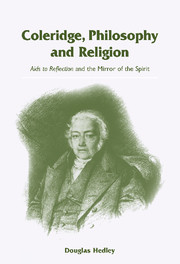Book contents
- Frontmatter
- Contents
- Acknowledgements
- List of abbreviations
- Notes on the text
- Prologue: explaining Coleridge's explanation
- 1 The true philosopher is the lover of God
- 2 Inner word: reflection as meditation
- 3 The image of God: reflection as imitating the divine spirit
- 4 God is truth: the faculty of reflection or human Understanding in relation to the divine Reason
- 5 The great instauration: reflection as the renewal of the soul
- 6 The vision of God: reflection culture, and the seed of a deiform nature
- Epilogue: the candle of the Lord and Coleridge's legacy
- Bibliography
- Index
5 - The great instauration: reflection as the renewal of the soul
Published online by Cambridge University Press: 15 December 2009
- Frontmatter
- Contents
- Acknowledgements
- List of abbreviations
- Notes on the text
- Prologue: explaining Coleridge's explanation
- 1 The true philosopher is the lover of God
- 2 Inner word: reflection as meditation
- 3 The image of God: reflection as imitating the divine spirit
- 4 God is truth: the faculty of reflection or human Understanding in relation to the divine Reason
- 5 The great instauration: reflection as the renewal of the soul
- 6 The vision of God: reflection culture, and the seed of a deiform nature
- Epilogue: the candle of the Lord and Coleridge's legacy
- Bibliography
- Index
Summary
… unless one is born anew, he cannot see the kingdom of God.
(John 3: 3)We should finally be clear that Christianity is not something external so that we are called Christians because we confess this or that doctrine … or do this good thing or avoid that bad thing. All these things can be just as much means or the fruits of Christianity if these are heartfelt. These are not the essence of Christianity: the essence consists of the rebirth.
(P. J. Spener, 1695)… if a man would be a student of divinity let him learn and practise his baptism.
(William Perkins)Coleridge is concerned to isolate a particular genesis of the Deism and Unitarianism of the eighteenth century. His insistence that the moral life requires divine aids, a communion with the divine spirit, leads him to trace a genealogy of Deism which sees the root of the problem exemplified in the Arminian Cambridge divine Jeremy Taylor. His understandable revulsion from the asperity of the Augustinian-Calvinistic emphasis upon human depravity and need, and his fear that this would subvert all attempts to preach and attain true holiness, led Taylor to assert a degree of human ethical sufficiency which seemed to subvert Christian stress upon human need for grace. Perhaps ironically, Coleridge employs arguments from the philosophy of autonomy, of Kant, to sustain his moderate Augustinianism against Taylor's Arminianism. Taylor was inclined to use arguments culled from the Dutch Arminian jurists, especially Hugo Grotius. Hence Coleridge is inclined to dismiss this moralising semi-Pelagianism as Grotianism, and sometimes speaks (disparagingly) of the Grotio-Payleian scheme in this context.
- Type
- Chapter
- Information
- Coleridge, Philosophy and ReligionAids to Reflection and the Mirror of the Spirit, pp. 229 - 265Publisher: Cambridge University PressPrint publication year: 2000



